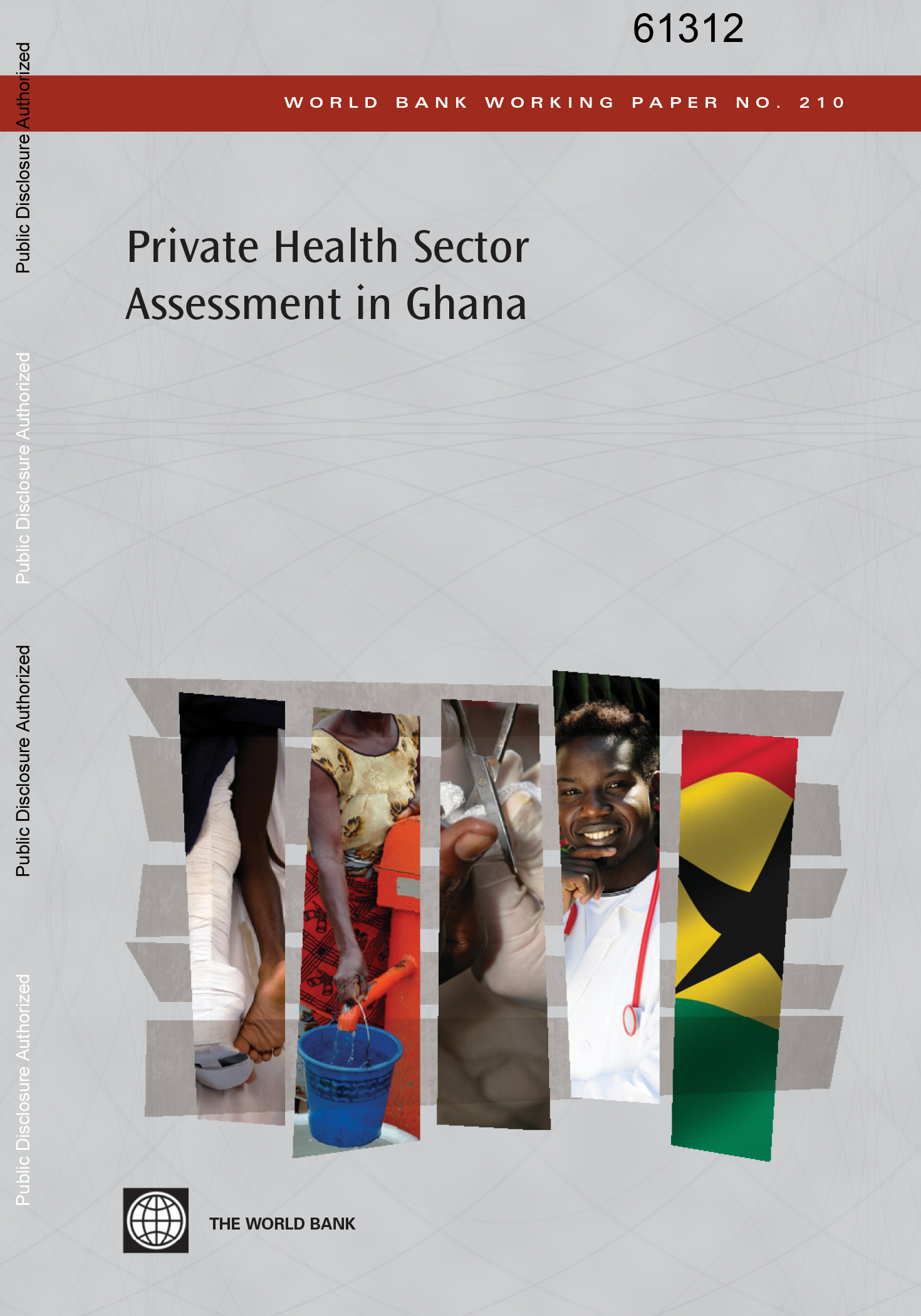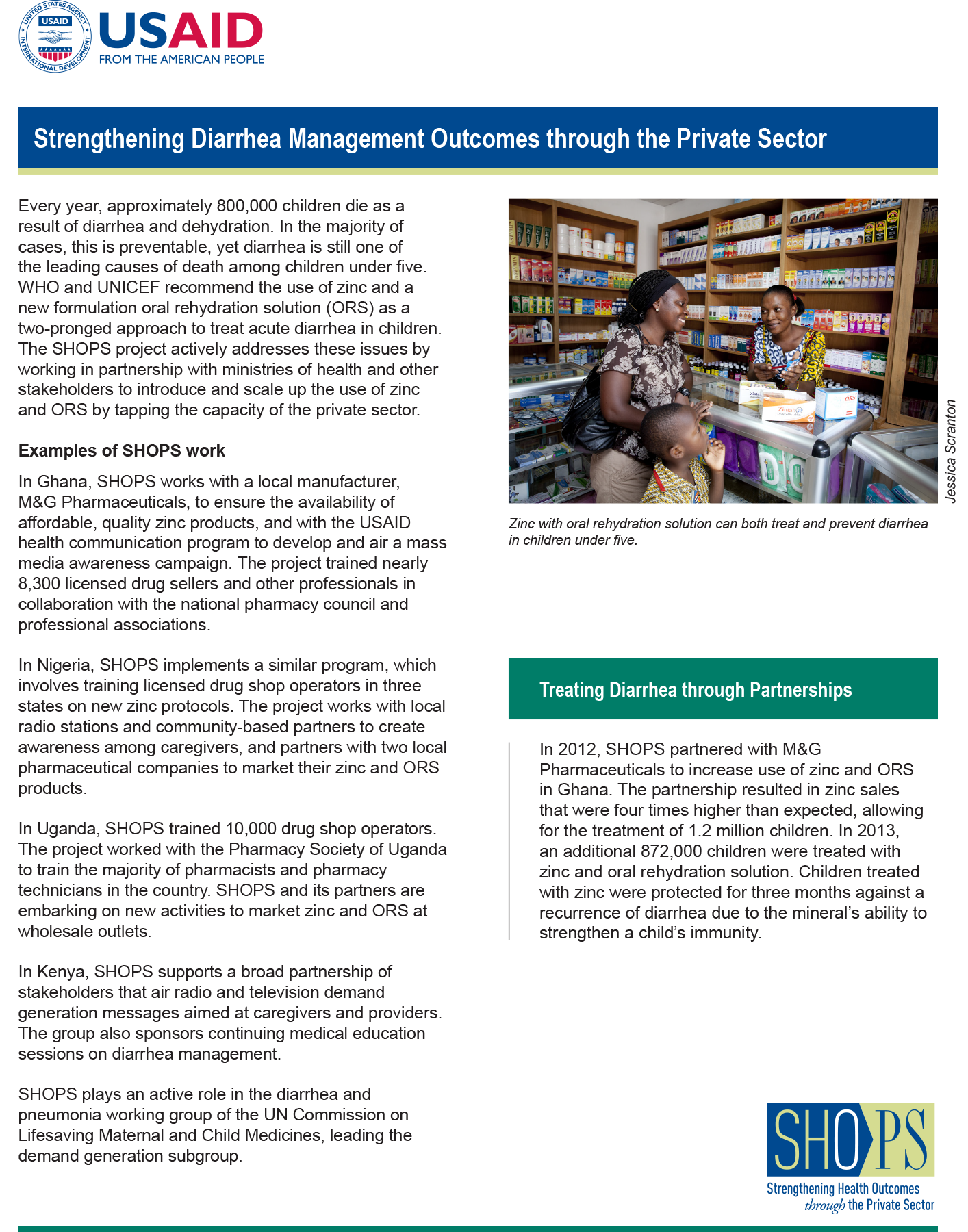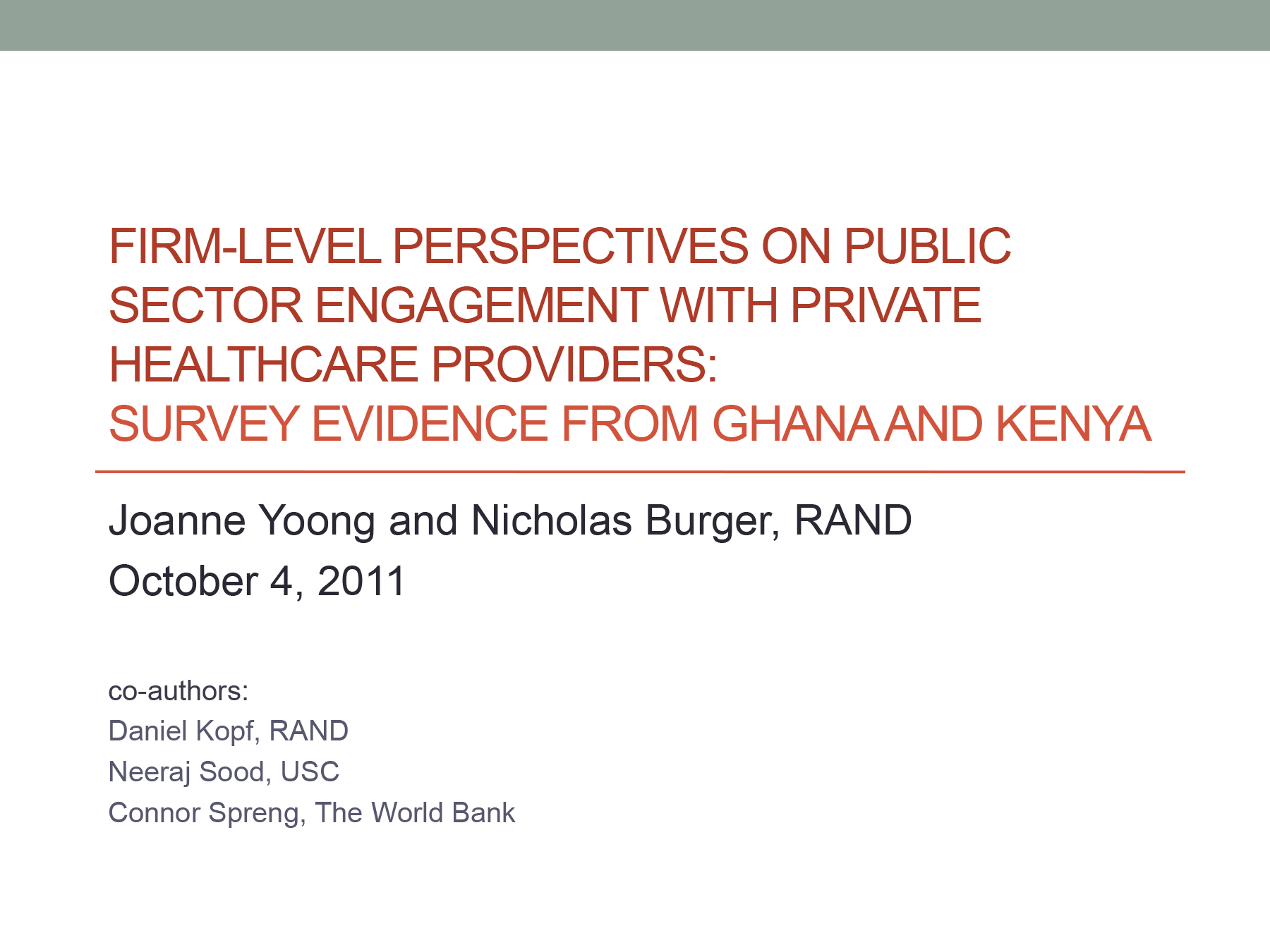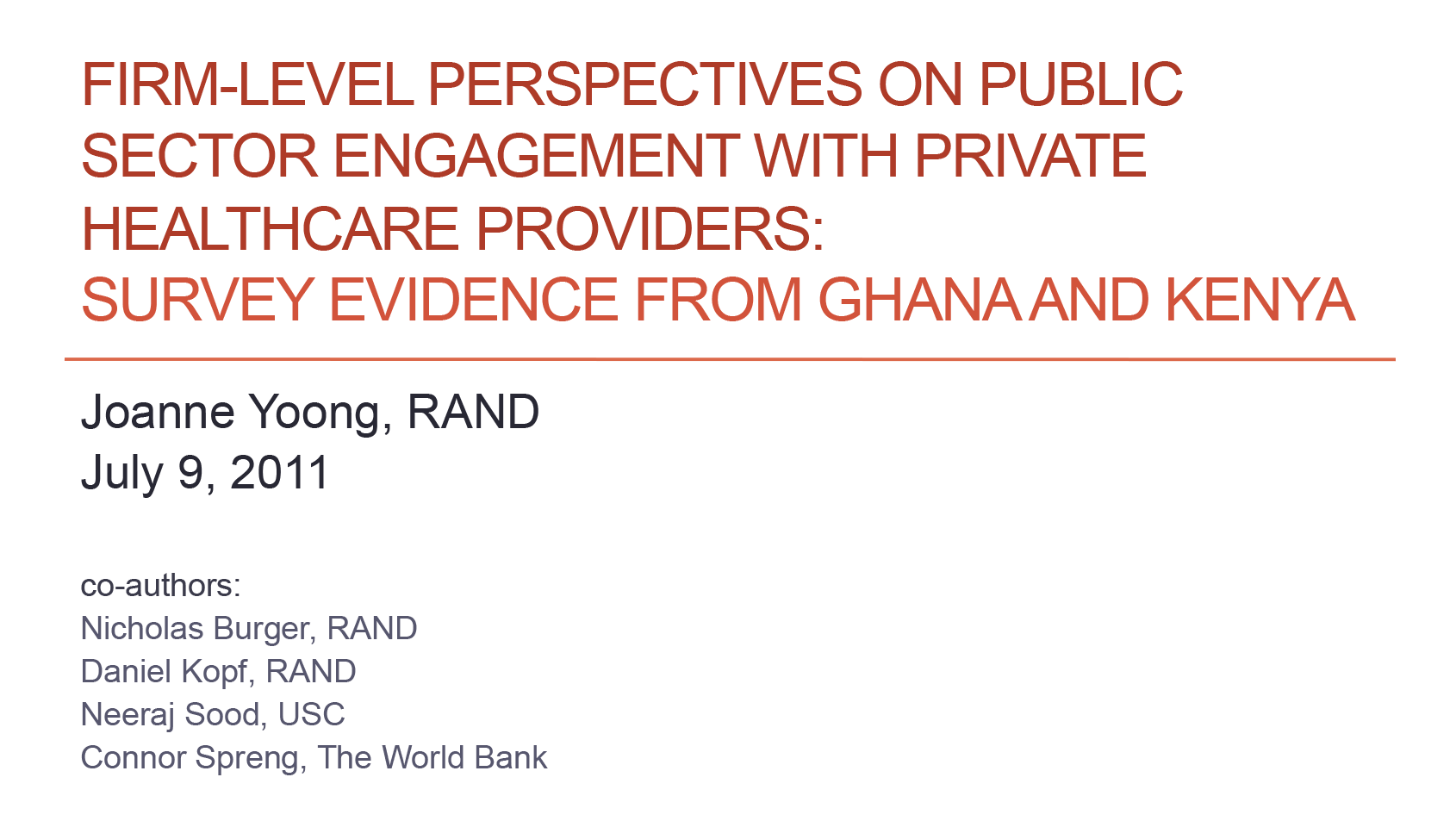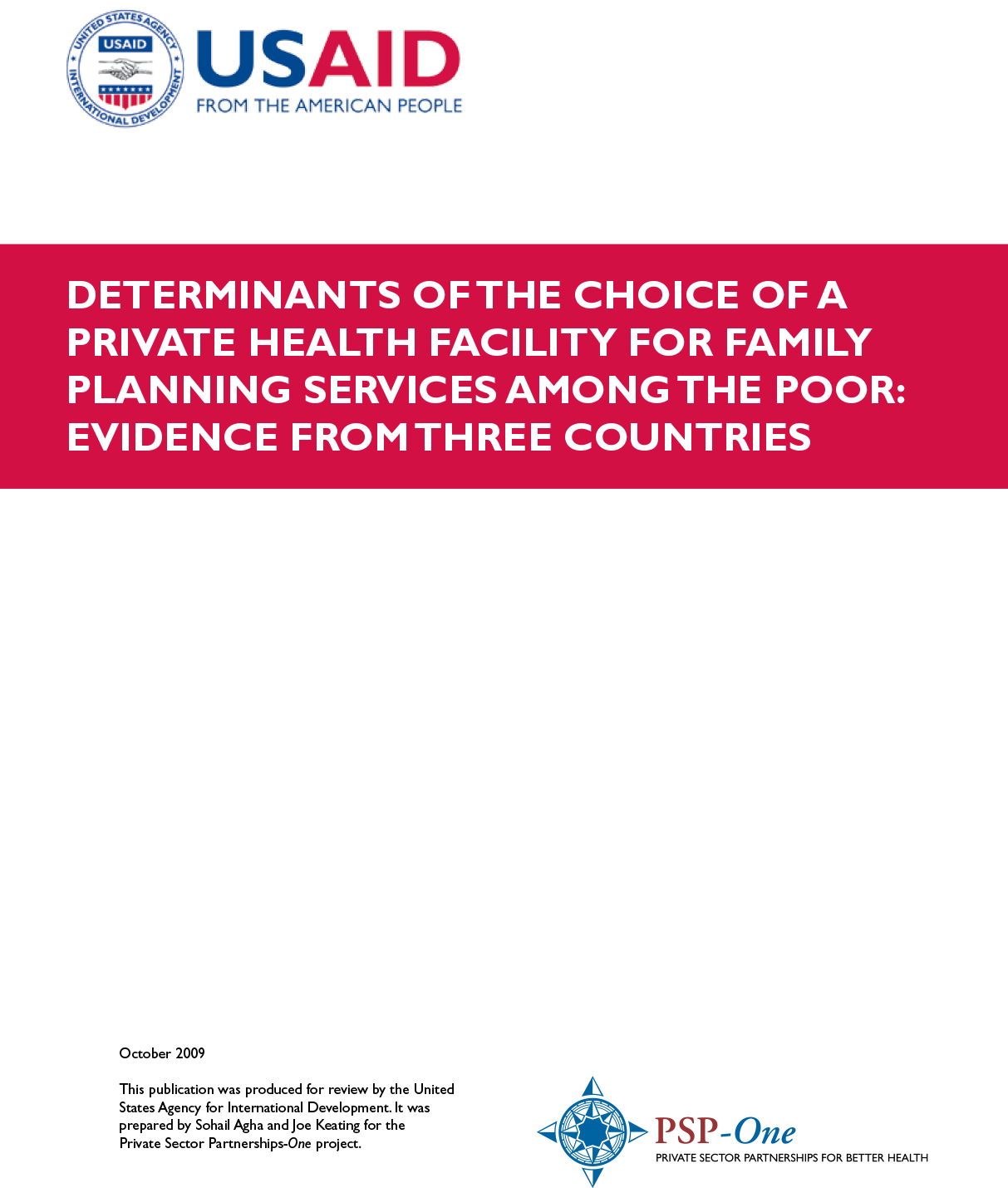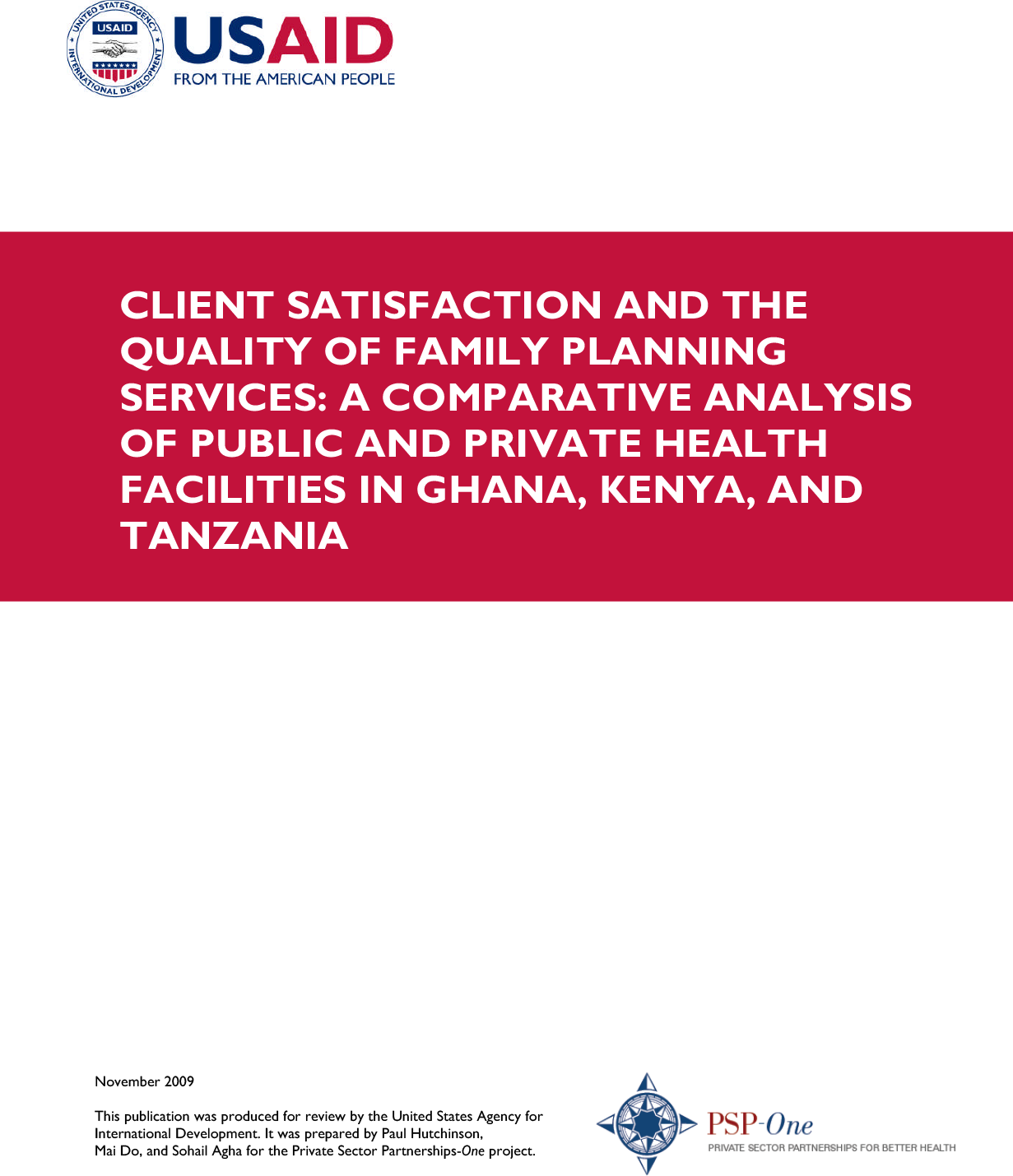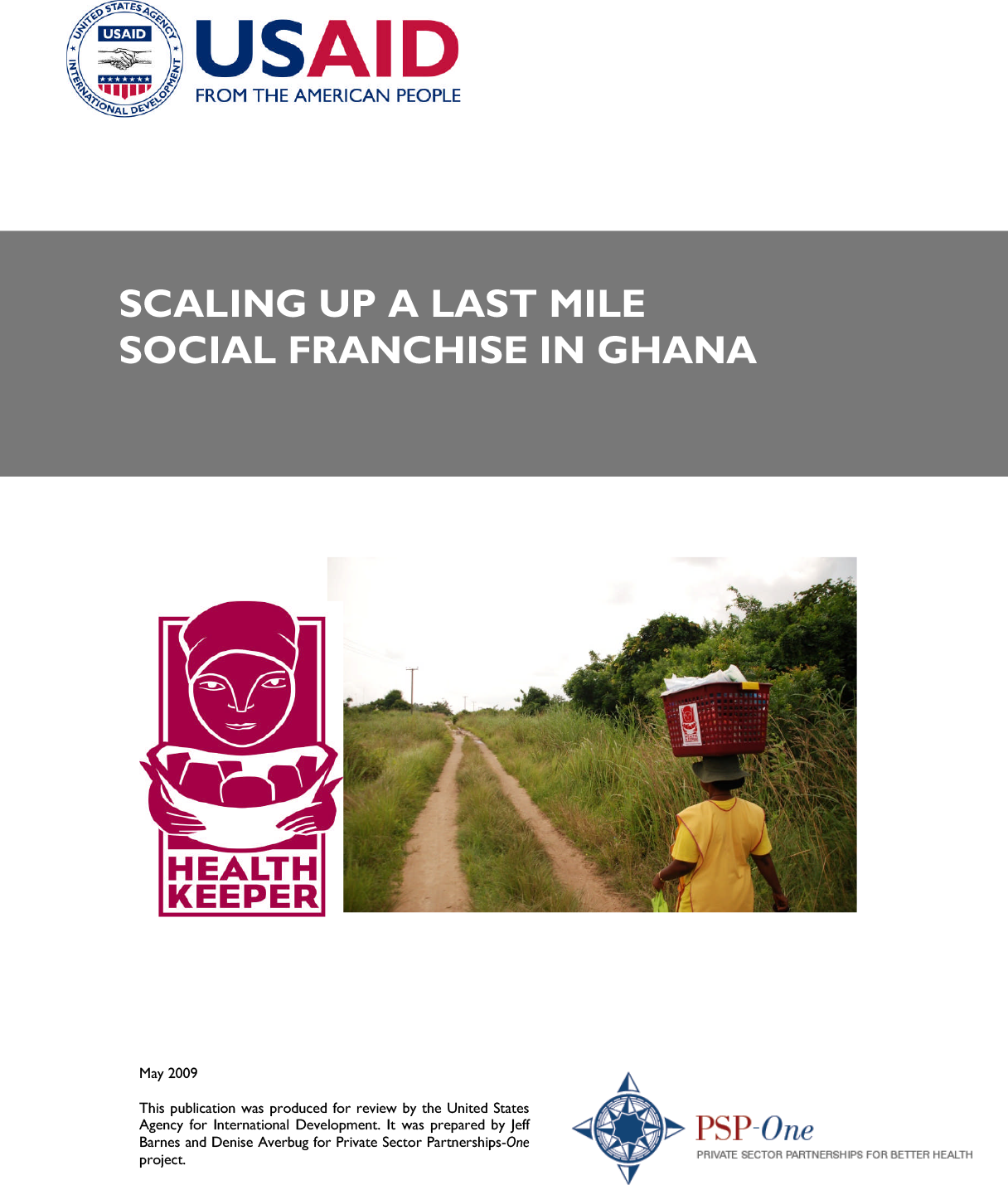
Resource Library
Private Health Sector Assessment in Ghana
This assessment sought to review the role currently played by the private health sector in Ghana, diagnose the nature and effectiveness of the interface between the public and private sectors, engage in policy dialogue with stakeholders, and develop recommendations for reform aimed at improving public-private engagement. The research team used a variety of methods to carry out the study including: secondary analysis of nationally representative household surveys in Ghana, mapping of the private health sector and short-form questionnaire with all formal health service providers—public and private—in Ghana; focus group discussions with a subset of private providers in the mapping sample; patient exit polls at a subset of facilities in the mapping sample; population focus groups with women and men in the mapped districts; and national-level key informant interviews. The researchers found that many of the human resources for health are concentrated in urban areas and chemical sellers appear to be the greatest and most accessible sources of services in rural and urban-poor areas. Users of all types, across socioeconomic status, geography, and sex, choose private providers for a substantial portion of their use of health services—in all cases, around 50 percent of their use of services, suggesting that the private sector plays a large role in the provision of health services in Ghana. Download the report for more information on the methods, findings and recommendations of the research team.
Resource Type : Report
Country : Ghana
Year : 2012-02-03T00:00:00
Language : English
Project : SHOPS

Resource Library
Strengthening Diarrhea Management Outcomes through the Private Sector
A one-page overview of the SHOPS diarrhea management team's work implementing new programs that focus on expanding access to low-cost ORS and zinc treatment products; working with local manufacturers of zinc products to assure quality and widespread distribution; developing demand creation media campaigns; and training providers and pharmacists in the new treatment protocols.
Resource Type : Brief
Country : Ghana
Year : 2014-02-15T00:00:00
Language : English
Project : SHOPS

Resource Library

Louis Nortey on Organizing the Private Health Sector in Ghana
Network for Africa member Louis Nortey is the acting president of Private Health Sector Association in Ghana (PHSAG). In this interview with Barbara O'Hanlon, private sector policy advisor for SHOPS, Nortey describes the purpose of this newly formed private sector umbrella organization and the challenges it faces. He stresses, among other things, the value of having an organizational structure in place.
Resource Type : Video
Country : Ghana
Year : 2011-12-05T12:00:00
Language : English
Project : SHOPS

Resource Library
Firm-Level Perspectives on Public Sector Engagement with Private Healthcare Providers
“Firm-Level Perspectives on Public Sector Engagement with Private Healthcare Providers: Survey Evidence from Ghana and Kenya,” explores the private health sector in sub Saharan Africa and its need for improvement. In this study, private health facilities in Kenya and Ghana were surveyed to understand the extent to which and how governments interact and engage with these facilities. Overall, findings suggest that there may be considerable untapped potential for greater engagement with private health facilities—particularly pharmacies. Improving engagement will likely help governments with limited resources to better take advantage of the private sector capacity to meet access and equity objectives and to accelerate the achievement of the Millennium Development Goals.
Resource Type : Presentation
Country : Ghana, Kenya
Year : 2011-10-28T00:00:00
Language : English
Project : SHOPS

Resource Library
Firm-level Perspectives On Public Healthcare Providers: Survey Evidence from Ghana and Kenya
Presentation by Joanne Yoong of "Session 2B: The Private Sector Role in the Overall Health System" at the International Health Economics Association bi-annual meeting in Toronto, on July 09, 2011 in a pre-Congress symposium.The Private Sector Role in the Overall Health System.
Resource Type : Presentation
Country : Ghana
Year : 2011-07-19T00:00:00
Language : English
Project : SHOPS

Resource Library
Mobile Technology for Community Health in Ghana
A narrated presentation contributed by Tim Wood of Columbia University and Jim Phillips of Grameen Foundation to the SHOPS mHealth eConference held on May 5, 2010. The presentation examines the MoTeCH program in Ghana, which aims to dveelop mobile phone-based health information technology and test the proposition that improved health information improves health outcomes.
Resource Type : Presentation
Country : Ghana
Year : 2010-05-05T00:00:00
Language : English
Project : SHOPS

Resource Library
Determinants of the Choice of a Private Health Facility For Family Planning Services Among the Poor: Evidence From Three Countries
Objective To determine how the structure, process, and outcomes of quality influence the choice of a public or private facility for family planning services among poor clients. Methods Data from three nationally representative Service Provision Assessment (SPA) surveys conducted in Kenya, Tanzania, and Ghana were used for the analysis. These surveys contain standardized variables measuring structural factors, the process of care provision, and client satisfaction with the quality of services provided. They also include information on whether clients who sought family planning services obtained services from public or private sector facilities. Clients' education was used as a proxy for their poverty status. Multivariate analysis was used to model factors associated with the choice of a public or private facility for family planning services. Results The most important structural factor associated with a poor client's preference for a private sector facility for family planning services was the presence of a trained provider at all times. Shorter waiting times and the maintenance of confidentiality were important determinants of the choice of a private facility for the poor in Kenya and Tanzania but not in Ghana. Poor clients' satisfaction with services provided was consistently associated with their choice of a private facility over a public facility. In particular, poor clients' satisfaction with their interaction with facility staff, the convenience of their visit, and the availability of family planning methods influenced their choice of a private facility. Fewer factors explained nonpoor clients' choice of a private or public facility. Shorter waiting times, privacy during consultation, and perceived cleanliness of the facility appear to be factors that attracted nonpoor clients to private facilities. Conclusions Structure, process, and outcomes of quality have independent effects on the poor's choice of public or private facility. Findings suggest that private facilities are more responsive to the poor. It is possible that because of their higher social status, the nonpoor may be able to extract similar levels of quality of care from both public and private facilities.
Resource Type : Report
Country : Ghana, Kenya, Tanzania
Year : 2009-12-07T14:15:00
Language : English
Project : SHOPS

Resource Library
Client Satisfaction and the Quality of Family Planning Services: A Comparative Analysis of Public and Private Health Facilities in Ghana, Kenya, and Tanzania
OBJECTIVES To measure the extent of quality differentials in family planning (FP) services at public and private hospitals and clinics in three countries (Ghana, Kenya, and Tanzania) and to determine how these differentials affect FP clients' satisfaction with those services. METHODS The analyses make use of data from the 2002 Ghana Service Provision Assessment, 2004 Kenya Service Provision Assessment, and 2006 Tanzania Service Provision Assessment. Multivariate regression assesses the association and relative importance of different measures of structural and process quality on client satisfaction. RESULTS Private health facilities appear to be of higher process but not necessarily technical quality in the three countries as measured by several quality attributes, though these differentials are considerably larger at lower-level facilities (clinics, health centers, dispensaries) than at hospitals. FP client satisfaction, however, appears considerably higher at private facilities – both hospitals and clinics – most likely attributable to better factors such as shorter waiting times and fewer stockouts of methods and supplies. CONCLUSIONS Private providers appear to be fulfilling an important gap in the provision of FP services in the study countries, providing FP services that are at least as good in technical quality on average as their public sector counterparts while also achieving higher levels of client satisfaction. Continued support and favorable – though not permissive regulatory environments can ensure that the private sector maintains this important role in women's health.
Resource Type : Report
Country : Ghana, Kenya, Tanzania
Year : 2009-12-04T10:15:00
Language : English
Project : SHOPS

Resource Library
Scaling Up a Last Mile Social Franchise in Ghana
In September 2008, Private Sector Partnerships-One (PSP-One) conducted an assessment to identify support strategies for the MicroBusiness for Health (MBH) franchise being piloted by Freedom from Hunger (FFH) in Ghana. In this social franchise, a neighborhood rural woman becomes the local sales representative and franchisee, or HealthKeeper (HK), for a line of health products. As the franchisor, MBH provides the women with health and other products to sell, training on sales and health promotion, and credit for their first basket of products. The specific objectives of the assessment were to:
- Identify ways to improve efficiency and cost recovery in the franchise model, especially in the area of distribution;
- Assess short- and long-term prospects for sustainability;
- Recommend appropriate monitoring and evaluation activities.
Resource Type : Report
Country : Ghana
Year : 2009-07-17T12:15:00
Language : English
Project : SHOPS

Resource Library
Report of the Regional Workshop on Building Public-Private Linkages to Advance Priority Health Services in Africa
1.1 ANTECEDENTS TO NETWORK FOR AFRICA AND ADDIS ABABA REGIONAL WORKSHOP The Private Sector Partnerships-One (PSP-One) project and the World Health Organization's Department of Reproductive Health and Research (WHO/RHR) continue to work together in support of increasing access to reproductive health and family planning (RH/FP) through the private health sector in Africa. In December 2006, PSP-One and WHO/RHR co-sponsored a consultation meeting on Public Policy and Reproductive Health Franchising and produced a joint guidance note on the evidence and future direction of private provider networks and franchising of RH/FP services (http://www.who.int/reproductive-health/healthsystems/meeting06.htm). Building on the success of this first policy meeting, the organizations designed a regional workshop focusing on Africa. With funding from the United States Agency for International Development's (USAID's) Repositioning Initiative,1 the PSP-One project is leading a two-year initiative — Network for Africa — that will build public-private linkages to advance universal access to RH in the region. WHO/RHR and PSP-One co-sponsored a regional workshop, held May 7-10, 2008, in Addis Ababa, Ethiopia, as one of the Network's first activities. 1.2 OVERVIEW OF ADDIS ABABA REGIONAL WORKSHOP The purpose of the workshop was to develop national capacity to design and manage partnerships with private sector stakeholders and provide an overview of the selected policy instruments commonly available to Ministries of Health (MOHs) and the public-private partnership (PPP) units. The workshop curriculum was based upon a World Bank Institute course on public policy for the private sector, which was revised for the African context and substantially updated with new information to reflect current trends in private sector provision of health services. Workshop objectives included:
- Developing existing public sector capacity to engage the private sector in the provision of RH/FP and HIV/AIDS-related services in selected Anglophone African countries
- Creating a network for experiential learning across countries on challenges in strengthening PPPs for RH/FP and HIV/AIDS
- Strengthening existing relationships and linkages across priority programs within African MOHs to work effectively with the private sector in support of national health goals (in general) and RH/FP (in particular)
- Identifying key actions and important next steps for participant countries to design, develop, and manage PPPs following the workshop
Participating countries: Teams of MOH officials from Ethiopia, Ghana, Kenya, Nigeria, United Republic of Tanzania, and Uganda attended the Addis workshop. The teams comprised: (i) the RH/FP director, (ii) the HIV/AIDS director, and (iii) the PPP unit director and/or PPP adviser. In addition, several USAID Health, Population and Nutrition (HPN) officers and President's Emergency Plan for AIDS Relief (PEPFAR) PPP advisers from these countries attended. (See Annex A for a directory of the participants.) Overview of workshop agenda: The workshop was designed around three thematic areas (See Annex B for a more in-depth discussion of the workshop agenda and methodology.):
- Making the case for why it is important to work with the private health sector as a means to help address health challenges in RH/FP and HIV/AIDS2.
- Offering a concise overview of the policy instruments the public sector can utilize to engage and encourage the private health sector to deliver RH/FP and HIV/AIDS services
- Designing a partnering process while, at the same time, stressing the management and leadership skills required to implement and sustain a PPP
Resource Type : Report
Country : Ethiopia, Ghana, Kenya, Nigeria, Tanzania, Uganda
Year : 2008-12-01T22:15:00
Language : English
Project : SHOPS
Pagination
- Previous page
- Page 5
- Next page


